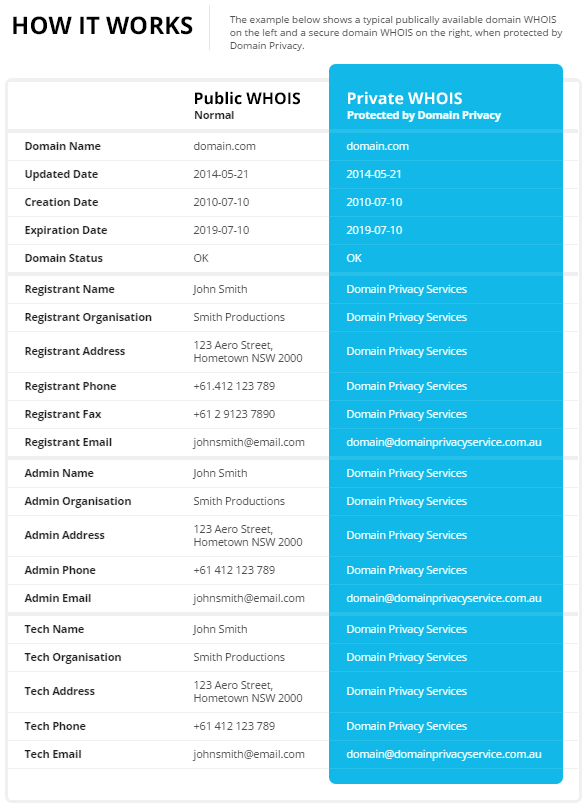What you need to be aware of to protect your privacy online

You’ve spent time, money and a lot of sweat to build your sex worker business and always valued your anonymity and privacy when it comes to your clients.
You’re probably running your business from home, and protecting your actual location and personal details is very important.
Did you know that your information is listed publicly on the WHOIS directory when you register your website domain name for all the world to see? WHOIS is a public directory that maintains a record of all domain registrations online. This includes domain registrant details, verifications, their expiry, renewal dates, and more.
It is a regulatory requirement that when you register your domain, you must include your personal information. However, there is a way to protect your privacy by opting for ‘domain privacy’ when your website is first created.
What is a domain privacy protection service?
A domain privacy protection service is an ‘add on’ service that you can purchase to protect your personal information, like your address, phone number and even your email address.
Take a look at what your registration might look like if it’s public and see the difference when it’s made private.

As you can see, your real address, phone number and email are hidden from the outside world, and only your business details are listed on WHOIS.
We understand how important your privacy is, and we always add on domain privacy when we register a domain on your behalf. Protecting your privacy is our default. We handle all website setup for our clients, including the domain registration process. Some common domain registrars include GoDaddy and NameCheap. We make sure that during the domain registration that the appropriate privacy settings are configured.
If you’ve already purchased and registered your domain before coming to us, let us know, and we can check if your domain registration details are currently private.
Your registered website domain name information is listed publicly on WHOIS. We can make sure it’s private for you.
#securewebdesgin #bumbershootcreative
#securewebdesign #bumbershootcreative
Why do you need a domain privacy protection service?
There are several reasons to keep your personal information private concerning your domain name.
The most important of these is to protect you and your private life. You want to make it as difficult as possible for other people to find your real details.
It also helps prevent spam to minimise telemarketing calls and emails, preventing them from pulling your details from public directories and bothering you unnecessarily.
Another unwanted problem that can occur if you don’t have your data hidden is that some unscrupulous companies engage in ‘data scraping’. They do this to collect personal data from publicly available sources like WHOIS and then sell it to third parties who use it for unsolicited contact.
Sometimes domain registrars will offer a privacy protection service to show their contact details in place of your own on a WHOIS database.
Not having domain privacy protection can also leave your site vulnerable to hackers, who could steal your identity and your website. You’ve worked too hard for that to happen!

Tip or Hint: Always check when registering your domain name that your host offers you the option of domain privacy protection. It will save you a lot of time and stress in the future.
But – domain protection isn’t available for all domains
Generic Top-Level-Domains (TLDs) are identified as .gov, .edu, .com, .mil, .org, and .net.
TLDs for most countries will not allow you to hide your details. For example, if you add the abbreviation for Australia (ie .au) to the end of the domain name, you won’t be able to hide your personal information on the WHOIS directory.
This is often done for business transparency reasons and makes sense for many other businesses, but it works against sex workers who need to prioritise their privacy.
You also need to have proof for domains such as .com.au that you own a business under that name in order to register it. In Australia, this may also require you to register your business name with ASIC, which can have additional privacy implications. When you register a business name in Australia, anyone who knows that registered business name can then look up who owns it, which is another way your private details could be compromised.
It’s best to check which TLDs that do not support privacy before you register your domain. If you want to be sure you’re choosing the right type of domain for your business, ask us to help you.
Some simple steps you can take to check your domain name
You can look up your current domain and see if any of your details are exposed already.
If your information is visible, login into your Domain registrar and look for an option to turn on Domain Privacy; sometimes, this option is bundled with other Domain protection options like transfer or hijack prevention and DNS services.
We also would like to inform you that there’s a great online event coming up that you might find interesting. “Informal, Criminalized, Precarious: Sex Workers Organizing Against Barriers” is being held over six dates in April 2021.
The panel will be discussing “Sexual Gentrification: An Internet Sex Workers Built” on Tuesday, April 6, between 12pm – 1:30pm EST. This panel will explore the “proactive and unique role of sex workers as digital innovators and the grave consequences of sexual gentrification on sex worker safety and livelihood”. If you’re interested in learning more about sex work and the internet, we highly recommend checking out this panel.
Bumbershoot Creative understand and implement greater online security, safety and reliability for sex workers.
If you are worried about your domain privacy, please get in touch, and we’ll put your mind at ease.

Your Sex Work-Friendly Web Designer
Kim is an independent filmmaker and web designer/developer. Her short films have been selected for and screened at festivals around the world from Perth, Australia to New York City. As the founder of Bumbershoot Creative, she aims to apply her own creative skills and experiences to new projects, helping and supporting her clients as they grow their own businesses and ventures.
Kim has years of experience building websites for individuals and businesses in the adult industry. As such, she understands the unique challenges that owners of adult businesses are often faced with, including billing discrimination, hosting and service restrictions, shadow-banning, and stolen content.